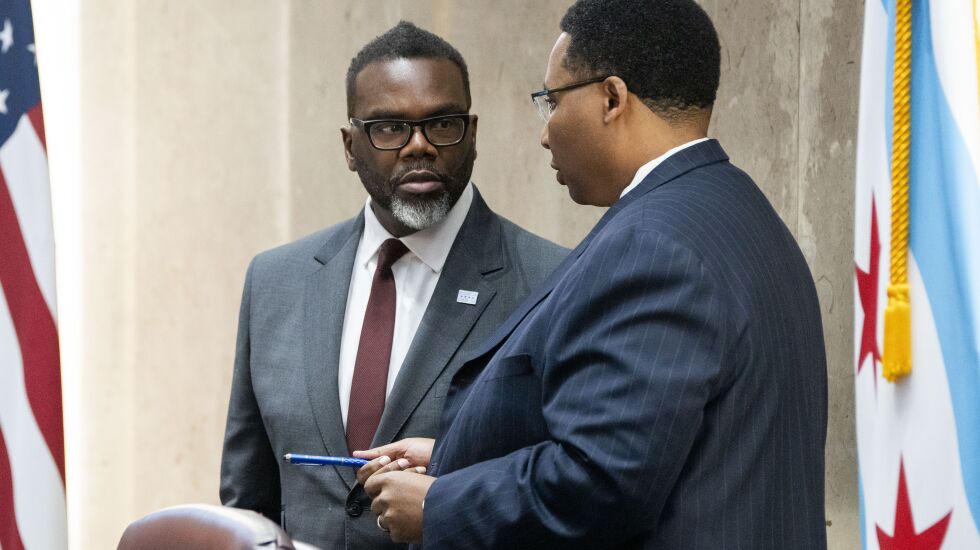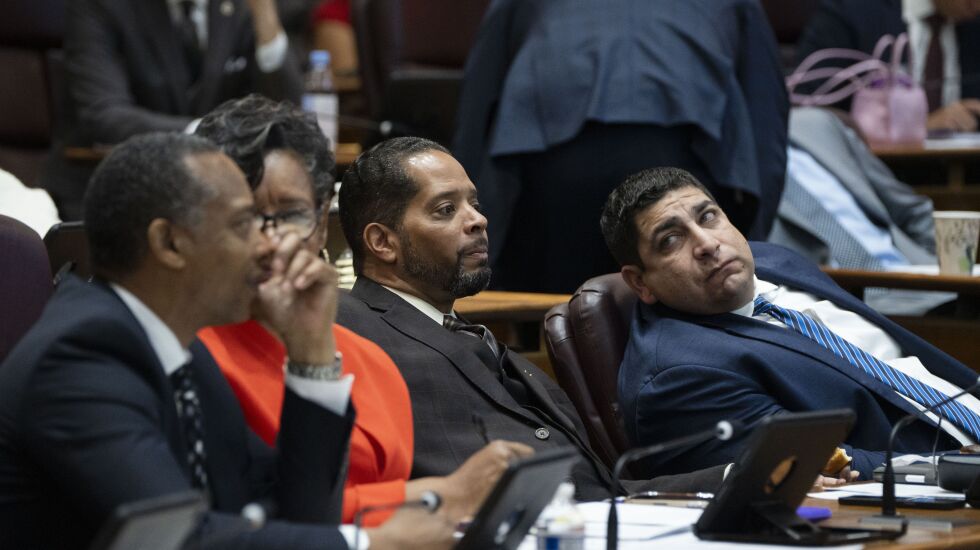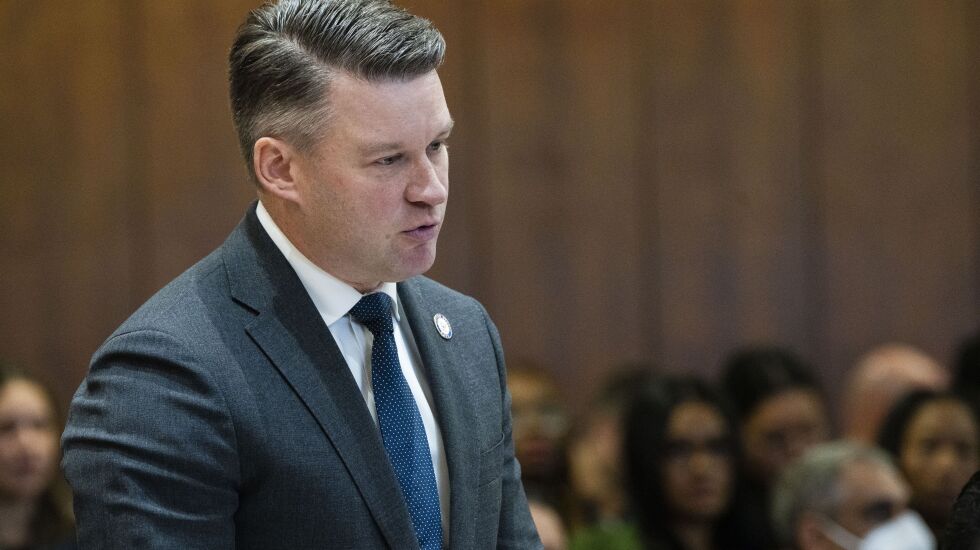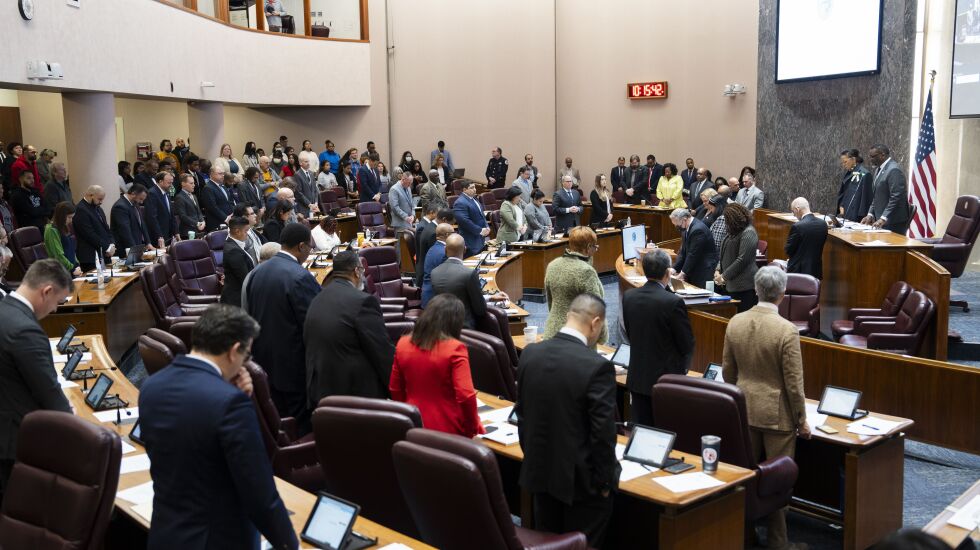
Mayor Brandon Johnson’s $16.77 billion budget breezed through the City Council Wednesday amid concern about police staffing and about where Chicago will turn without an infusion of state and federal help for the migrant crisis.
The final vote was 41 to 8. It was somewhat surprising that it wasn’t unanimous, considering the fact that the budget holds the line on taxes and increases spending for an array of popular programs — even compared to the record-high spending made possible by federal funding that poured into Chicago during the pandemic.
Before casting their dissenting votes, several naysayers argued Johnson’s first budget is “not balanced” because it earmarks only $150 million for a migrant crisis now costing the city more than twice that.
Ald. Anthony Beale (9th) cited three reasons for not supporting the budget.
“Number 1, the budget is not balanced. Number 2, the budget is not balanced. Number 3, the budget is not balanced,” Beale said.
Noting the city is already spending $40 million per month on the migrant crisis, Beale said the $150 million budgeted “gets you through four months. What are we going to start doing come April when we run out of money? Hope and pray that the state and federal government gives us money? ... We have a president who is fighting for his [political] life. We have a Republican-controlled [U.S.] House. The chances are slim-to-none.”

Beale also complained the 400 civilians Johnson plans to hire to free police officers for street duty would do nothing to fill the 2,300 police vacancies, counting the 614 sworn vacancies eliminated by former Mayor Lori Lightfoot.
“There’s no urgency about hiring more police to put on the street that all of us need in our communities. We’re all dealing with carjackings, car break-ins, murders, you name it,” he said.
Joining Beale in voting ‘no’ were alderpersons Marty Quinn (13th); Ray Lopez (15th); David Moore (17th); Silvana Tabares (23rd); Scott Waguespack (32nd); Brendan Reilly (42nd) and James Gardiner (45th). Ald. Debra Silverstein (50th) was sitting shiva and did not attend the meeting or vote remotely.
Companion ordinances tied to the budget — including the property tax levy, the management ordinance, budget amendments and corrections and the annual motor fuel tax — all passed by voice vote.
Ald. Jessie Fuentes (26th), one of Johnson’s staunchest Council supporters, shares Beale’s concerns about migrant funding running short.
“But I don’t expect that any of us are going to sit back and hope and pray. We’re gonna ... get to work ... to demand for our federal delegation to invest in our migrant mission, to hold our governor accountable and our state legislators to also have skin in the game,” Fuentes said.
“Migrants, immigrants, families alike have built this city. They have become a part of the very fabric. This budget, in saying, yes, to leading on the migrant mission shows, not just Chicago but the rest of the world that we are going to continue to show up for individuals that come to Chicago to seek refuge to seek safety and that also want to contribute to what it means to live in the greatest city in the world.”
A surprise ‘no’ vote from Moore
Moore was a surprise “no” vote. He argued Johnson’s decision not to take advantage of an automatic escalator tying future property tax increases to the rate of inflation would set the stage for an even bigger increase down the road.
More importantly, Moore tied his dissenting vote to a more parochial issue: the new mayor’s failure to improve a field house in his ward that is so run down, it’s “like a prison.”
“I didn’t ask for the whole $35 million this year. I asked for $10 million. For the kids — not for David. This is coming from my constituents: ‘Bring us something back home. Don’t vote on nothin’ unless there’s something in there for the community.’ That’s what they told me,” Moore said.
“Because of that, I cannot support this budget because I can’t go to my constituents and say, ‘This is what I’m bringing home to you.’”
Ald. Bill Conway (34th) was a surprise supporter after top mayoral aides assured him the $100 million being siphoned from the LaSalle Street tax increment financing district to create a record TIF surplus would not jeopardize efforts to transform LaSalle Street office buildings into residential and retail uses.

Senior mayoral adviser Jason Lee refused to say Wednesday where Johnson would turn first if Chicago is forced to go it alone or if federal and state help that does come through falls short.
“I guess we’ll have to wait and see. My guess is that, in relatively short order, there’ll be a different dynamic in terms of understanding what the federal and state contributions are,” Lee said. “We should ask that question after we see what these other jurisdictions are doing. We feel confident there will be support there for this endeavor.”
Past time to pass ‘Peacebook ordinance,’ Taylor says
Ald. Jeanette Taylor (20th) used her speech in favor of the budget to lecture colleagues who have repeatedly thwarted the “Peacebook Ordinance” championed by the youth group Good Kids Mad City.
That ordinance would divert 2% of the Chicago Police Department’s $1.99 billion budget to bankroll programs led by young people in Chicago neighborhoods plagued by gang violence.
“The reason why our city is in chaos is because we’re in chaos. We don’t work with each other. We don’t talk to each other. We pick and choose who we’re gonna talk to and who we’re gonna work with. We don’t hold each other accountable. Y’all expect for our city not to be acting a fool? We’re all down here acting a fool,” Taylor said.
“We all sit here and get up and give these elaborate, beautiful speeches about working together. That ain’t what I see. That’s not how our city sees it.”
The always emotional Taylor noted young people in her impoverished South Side community have been “fighting for the Peacebook” since before she took office. It simply says is, “We will give money to young people to help solve their own problems,” she said.
“It is wrong for us to not do what we should’ve done a long time ago. ... Let’s have a conversation with Black Chicago about what it really needs and what it really wants,” she said.
“We’re always talking about what young people do or don’t do. But we vote against their interests. Every time that ordinance has been called, somebody calls it to Rules,” the committee where legislation typically is assigned to languish. It is, she said, “no more than ignorance and arrogance. But then you worry about why they’re in your downtown. They wouldn’t be if they had things in their community.”
Former Mayor Richard M. Daley loved to pitch a shutout on the budget, the most important Council vote of the year. He managed to deliver unanimous votes seven times in 22 years, including five straight: 2000-2004.
Former Mayor Rahm Emanuel’s first budget passed 50-0 despite being balanced with $220 million in taxes, fines and fees, 517 layoffs, two police station closings and consolidation of 12 mental health clinics into six.
By that standard, Johnson also should have expected a unanimous vote on his $16.77 billion budget.
Johnson’s budget freezes the city’s property tax levy while capturing growth from new property. And it includes none of the $800 million in tax increases Johnson advocated during his mayoral campaign.
It increases the police budget; opens two mental health clinics (in existing buildings, to save money); doubles staff for a program that frees police officers from responding to mental health emergencies; and creates new departments of Environment and Innovation and Technology. Another 4,000 summer jobs for young people also will be created.
Johnson even sweetened the pot with amendments funding: a fourth full-time staffer for each Council member; a $5 million Office of Re-Entry for ex-offenders; and $500,000 to start trying to find a way to pay reparations to Chicago residents descended from slaves.
Unanimity unlikely; ‘the Council has changed,’ top Johnson aide says
Despite those goodies, and more, the Johnson administration knew the vote wouldn’t be unanimous.
“It’s almost like partisan politics, even though it’s not a partisan institution. There’s certain people who kind of cast themselves as the loyal opposition and kind of stay in that posture, regardless of the merits of a particular thing,” Lee told the Sun-Times shortly before Wednesday’s vote.
“What we’re talking about is a commitment to the principles that the mayor laid out in the campaign. ... The mayor wants people to validate things that are good for their constituencies. ... But the Council has changed. There’s a different dynamic around how certain individuals operate under any mayoral regime. We accept those realities.”

With the budget passed, Johnson can turn his attention to the binding “Bring Chicago Home” referendum on the March primary ballot. It would ask voters to authorize the Council to alter the city’s real estate transfer tax; the rate would drop on sales below $1 million, quadruple the rate on transactions over $1.5 million, and more than double the tax on sales in between.
The business community — particularly real estate interests — is expected to spend millions to try to defeat the question at the polls or, if necessary, in the Council.
That upcoming political battle helps explain why Johnson punted the search for new revenue to a Council subcommittee and did not follow his predecessors’ lead by socking it to taxpayers in the first budget after his election and holding the line after that.
“One of our biggest initiatives was ‘Bring Chicago Home,’ which does include new revenue. ... It has to be done through a ballot referendum. But we encouraged and leveraged political capital to pursue a revenue concept that was one of the biggest ideas from the campaign and had to do that now to reap the benefits in the near future,” Lee said.
“There’ll be more conversations to come. … It’s a combination ... finding revenue, but also growing the pie. We’ll continue to flesh out ideas further that have enough support to get through, which is the key with revenue. It’s not just about having an idea on paper.”







